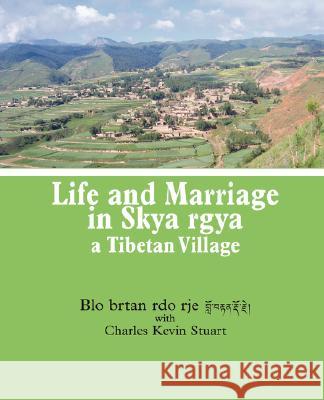Life and Marriage in Skya rgya, a Tibetan Village » książka
Life and Marriage in Skya rgya, a Tibetan Village
ISBN-13: 9780980050844 / Angielski / Miękka / 2008 / 232 str.
From the book's preface: Skya rgya is a farming village in A mdo, Tibet] While Tibetans largely welcome the material benefits that have been brought to them by the march of modernity, it is also inevitable that many of their older traditions have come to be seen as outdated. By juxtaposing voices from earlier periods with those that reflect contemporary experiences, the author] has provided us with a fascinating window onto the processes of change and development, as they are being experienced by Tibetans in this area. The author's narratives give] us a direct and vivid insight into the lives, experiences and expectations of members of his home community. Fernanda Pirie
The Centre for Socio-Legal Studies, Oxford University
Also from the book's preface: Blo brtan rdo rje's honest rendering of the details of his family life . . . make this a page-turning account of life in a rural Tibetan area that is already vanishing. When Blo brtan rdo rje was young, there was not even a bridge to cross the Yellow River into Gcan tsha County. . . .After bridges were built in the late 1980s, life has been changing rapidly This is not to suggest that no change had come to this Tibetan village before this time, as the arrival of the troops of the Muslim warlord, Ma Bufang, prior to the Communist period are also documented here. The forced conversion of neighboring (down-valley) Tibetans to Islam was a crucial vehicle for the later commercial changes introduced in the 1990s. . . . this new book could serve as an important part of courses on Tibetan culture, cross-cultural studies of marriage and gender relations. I congratulate Blo brtan rdo rje and Kevin Stuart on this impressive contribution to Tibetan studies Gray Tuttle
Department of East Asia Languages and Cultures
Columbia University From the author's introduction: I was born in 1979, the only son of a ten-people farming-herding family on 4.3 acres] of farmland on which we cultivate wheat, barley, peas, rapeseed, potatoes and a few vegetables for self-consumption. In 1985 my father (Rin chen bsod nams, b. 1954) put me on one of our several donkeys and the two of us set out for my paternal grandmother's (Phag mo sgrol ma, b. 1927) home in the mountains. . . .It took us most of the day to reach Grandmother's home, which was a single room where she lived, a long second room for the sheep and goats and a fenced area for the yaks. The area around Grandmother's cottage was mountainous. . . . There was no electricity. Rapeseed-oil lamps provided light at nights. Grandmother fetched water in a wooden bucket that she carried on her back from a transparent stream. . . . Bread with milk tea was our breakfast and lunch. We ate noodles with, sometimes, a few chunks of pork but rarely vegetables. I have three sisters. My elder sister . . . has twin, six year old sons who had not started school in 2006. . . . My two younger sisters are both university students and their school tuition has become a significant worry for my family. My parents have now moved to the local county town where they bought a cheap house with a small yard with the money they earned from selling our family's sheep and goats. Mother raises four milk mdzo mo (a female yak-cow cross) from which she earns an average of twenty-five yuan (about $3.50) per day by selling milk and yogurt in the street. Father does whatever temporary work he can find. . .that pays fifteen to twenty yuan per day ($2.15 to $2.86). . . .Kids from richer families call my mother 'Skya rgya Beggar' when they see her selling milk and yogurt in the bustling streets. This humiliates and causes much pain.











